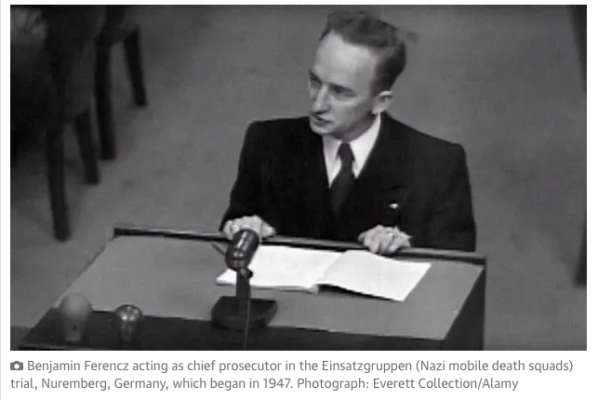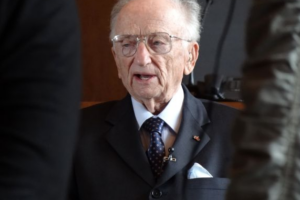CNA, The Guardian and other sources—The last surviving prosecutor of the Nuremberg Trials, Benjamin Ferencz, died last week on Good Friday at the age of 103. Ferencz secured the convictions of 22 Nazis for the murder of 1 million Jews during World War II. He spent the rest of his life advocating for human rights.
At the age of 27, Ferencz was assigned to prosecute the Einsatzgruppen (mobile killing units) trial, in which 22 former  commanders were charged with war crimes and crimes against humanity. He relied on the Nazi’s military records to prove that Nazi death squads had targeted and gunned down thousands of Jewish people, along with other “undesirables,” at a time while occupying areas of Eastern Europe.
commanders were charged with war crimes and crimes against humanity. He relied on the Nazi’s military records to prove that Nazi death squads had targeted and gunned down thousands of Jewish people, along with other “undesirables,” at a time while occupying areas of Eastern Europe.
The Guardian—His reputation rested on two criminal trials he conducted at the age of 27 before U.S. military courts sitting at Nuremberg in 1947 after the second world war. At the time, he had no previous experience leading courtroom prosecutions.
His first case was against SS officers who organised the Einsatzgruppen mobile death squads operating in Nazi-occupied eastern Europe. An estimated two million people were shot or beaten to death and their bodies dumped in pits; the majority of the victims were Jewish.
The documentary evidence Ferencz assembled was so persuasive that he did not need to rely on witnesses. Opening his argument, Ferencz declared: “Vengeance is not our goal … we ask this court to affirm by international penal action man’s right to live in peace and dignity.” It was later dubbed the biggest murder trial in history.
Twenty-two of the 24 Einsatzgruppen defendants were found guilty of crimes against humanity. Fourteen were sentenced to death and four eventually hanged. Ferencz had not requested the death penalty.
His second Nuremberg trial, in which he appeared as special counsel, involved the Krupp armaments group, whose directors were accused of crimes against humanity and exploitation of 100,000 slave labourers. Eleven directors were found guilty, and served prison terms of between three and 12 years.
CNA—Ferencz made his final public appearance at an event in late March at the Catholic University of America. During a brief appearance on Zoom, Ferencz spoke about the importance of ensuring human rights for all people, no matter the circumstances.
“We are looking for human rights, meaning all human rights. No one is to be treated as subhuman, or unworthy of being saved,” Ferencz said during the conference.
“We are trying to advance a principle that all human beings are entitled to be treated as human beings, and treated accordingly. And so if we can contribute toward that, it would be worthwhile … I hope that you will finally decide that you are believers in equal rights for all people, regardless of their race, religion, or anything else. And that’s what I have stood for. That’s what Nuremberg stood for,” he said.
Born in central Romania in 1920 to illiterate parents, Ferencz grew up in New York City after the family emigrated to escape antisemitism. He trained as a lawyer at Harvard and later fought for the U.S. in World War II. His legal experience led him to become a war crimes investigator, and he was recruited as a prosecutor for the Nuremberg Trials in 1946. Most of those Nazi officials whose prosecutions he secured were sentenced to death, even though Ferencz had not asked for the death penalty.
Throughout the rest of his life, he advocated for a permanent international criminal court, which came to fruition in 2002. His wife since 1946, Gertrude, died in 2019.
Writing at The Catholic Thing, Michael Pakaluk, a professor in the Busch School of Business at the Catholic University of America, said he believes Ferencz’s principles, especially of never treating people as “subhuman,” apply to modern-day debates over the morality of abortion.
“It’s obvious that legal abortion is wrong on Nuremberg principles. A child before birth is a human being just as much as a child after birth,” Pakaluk wrote.
“Therefore, anyone who wishes to advance the Nuremberg principles today, to do so consistently, and in opposition to their most widespread violation, must by a deliberate act of will reject legal abortion.”






You must be logged in to post a comment.